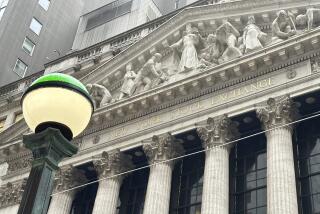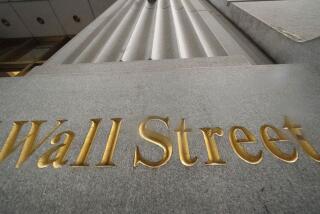Outlook for Bond Funds Could Sour if U.S. Economy Continues to Improve
- Share via
Concerns about the economy and terrorism were a boon to the bond market in the first quarter, encouraging more investors to play it safe and lock in yields on fixed-income securities.
Demand for bonds helped drive prices up and yields down. The result was a positive “total return” -- interest earnings plus price appreciation -- for every major bond mutual fund category, according to fund tracker Morningstar Inc.
The average long-term government bond fund, for example, gained 4.2% in the quarter. The average fund that buys long-term California municipal bonds was up 1.5% in the period.
But the picture changed markedly Friday, after the government said the economy had created a net 308,000 new jobs in March. Interest rates jumped on the news, and by Monday the annualized yield on the benchmark 10-year Treasury note had reached a three-month high of 4.21%, up from 3.88% on April 1.
By Wednesday the 10-year T-note had eased somewhat, to 4.15%. But many bond market professionals warn that the risks are high that long-term bonds, particularly Treasury issues, could be slammed in the next year if a stronger economy pushes the Federal Reserve closer to tightening credit for the first time since early in 2000.
A jump in market rates would devalue older bonds issued at lower fixed rates, potentially leading to negative total returns.
Bill Gross, who manages the Pimco Total Return fund in Newport Beach, the world’s largest bond fund, doesn’t mince words about Treasury issues.
“Construct an ABT portfolio: Anything But Treasuries,” he advises in his latest monthly investment commentary on Pimco’s website.
The outlook for other bond fund sectors varies, analysts say. If interest rates rise worldwide with a strengthening economy, all bonds might suffer. But Gross and others worry less about rising rates in Europe, for example, because the economy there isn’t expected to be as robust as the U.S. economy.
High-yield corporate “junk” bonds and bonds issued by emerging-market countries, such as Mexico, also could face less trouble from a stronger economy, in part because a better business outlook could improve the creditworthiness of those bond issuers.
In the tax-free municipal bond market, securities issued by California could become more attractive if the state can solve the budget woes that have left it with the lowest credit rating of any state, many analysts say.
Still, investors who expect the Fed to begin raising its key short-term interest rate (now 1%, a generational low) this year or in 2005 should realize that the environment probably would turn sour for all fixed-income securities, to some degree.
More to Read
Inside the business of entertainment
The Wide Shot brings you news, analysis and insights on everything from streaming wars to production — and what it all means for the future.
You may occasionally receive promotional content from the Los Angeles Times.










